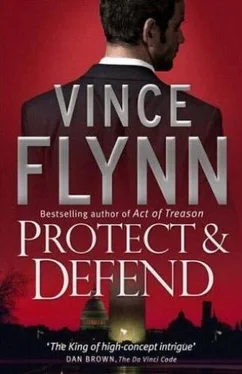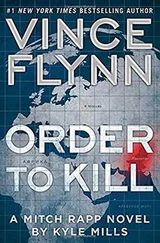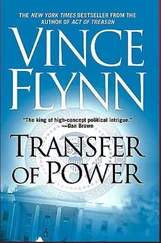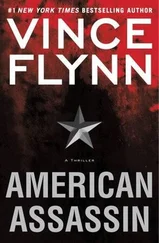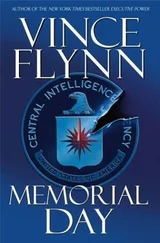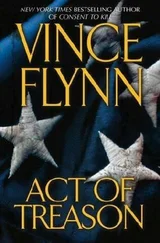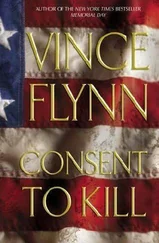The terrorist’s train of thought bounced from one subject to the next, and the only common thread had to do with a comment Rapp had made about the seventy-seven virgins that were supposedly awaiting Abbas in paradise. Abbas had been rambling on and on about how he was not afraid to die. Allah had a special place for him. He would have his pick of the finest seventy-seven virgins. Rapp told Abbas is was too bad he wouldn’t be able to have sex with them. When Abbas asked why, Rapp told him because he was going to cut off his dick. This one comment sent the thirty-some-year-old terrorist into a fit of blubbering tears. Some twenty minutes later he was now trying to engage Rapp in a theological debate over whether or not his penis would magically reappear when he reached paradise.
Rapp decided that giving the man sodium pentothal had been a mistake. He stood and looked down at Abbas. “It doesn’t matter.”
“Of course it does,” Abbas replied with tear-filled eyes.
Rapp thought about telling the man the virgins didn’t exist, and even if they did he would undoubtedly be on an express elevator to hell, in which case his penis wouldn’t matter, but he decided it wasn’t worth it. It was time to call Ashani again and put more pressure on him. He left the interrogation trailer and went back to the office trailer, where Dumond, Stilwell, and Ridley were holed up in the conference room working the phones and computers. Rapp felt a wave of hopelessness. They were not making anywhere near enough progress.
He looked across the room at Stilwell and asked, “Anything new?”
“Yeah. Come here and look at this photo.”
Rapp walked around the conference table and looked at the computer screen. On it was the photo of Kennedy that President Amatullah had shown during his speech.
Stilwell clicked on the wall behind Kennedy and zoomed in on that part of the photo. “They’re holding her underground, and I’m pretty sure she’s in the city. This type of limestone is quarried near the river. You can find it in cellars all over the city, but it’s predominantly found in the old section of the West Bank.”
Rapp studied the photo. Bands of green and black mold streaked the rocks closest to the floor, and white clumps of calcification could be seen near the corner. “He’s making mistakes.”
“How so?”
“Terrorism 101, cover the walls with sheets, so you don’t give up clues like this.” Rapp felt a glimmer of hope. “He’s someplace he wasn’t planning on, and my guess is, he’s short on people too.”
“Really,” Stilwell said with feigned surprise. “You only killed about twenty of his men this morning.”
Rapp ignored the comment and said, “Make copies of this section of wall and get it to all the military units. Also, track down any local stonemasons and see if they can give us a better idea of where this might be.”
Moving on to Dumond, Rapp asked, “Any luck with Ashani’s cell phone number?”
“Nothing. The only thing we came up with today was the call you made to him, and a call he made to his wife.”
“Shit.” Rapp ran a hand through his thick black hair. “Is the NSA giving you everything you need?”
“And then some. With all the drones up in the air and the satellites overhead we’re picking up so much stuff, the translators are having a hard time keeping pace. If we had a sample of Mukhtar’s voice it would help.”
“I’ll see what I can do.” Rapp grabbed his cell phone and scrolled back a couple of calls until he found the one he was looking for.
TEHRAN, IRAN
With the blessing of Amatullah, Ashani had rushed back to the Ministry of Intelligence. He had told Amatullah it was not wise to conduct such a risky operation from the Presidential Palace. Ashani now sat at his desk with the piece of paper Amatullah had given him resting squarely in the middle of his leather desk pad. Next to it was a small index card with the number and e-mail address Rapp had given him. Across the room, sitting atop a credenza, a TV replayed the speech of the American president.
Ashani watched at first with his usual analytical detachment. He did not know a great deal about President Alexander, but he had a general feel for the man’s speaking style. Like most politicians, he talked a lot, and when he talked about Iran, Ashani’s people made sure he received a DVD of the speech. He could tell from the first line of this speech that Alexander was not going to roll over.
By the time Alexander got to the part about the Yusef sinking the Sabalan, Ashani feared the worse. It all came back to him now. The knowing glances between the generals at the Presidential Palace during Amatullah’s speech, Amatullah ordering Mukhtar to accompany him to Mosul-it was all a deception, and the madman actually thought he was going to get away with it.
As the American president continued to lay out the facts, Ashani grew increasingly anxious. What path were these supposed leaders leading them down? Then the photo of Ali Abbas appeared on the screen along with those of the two Iranian Republican Guardsmen. Right when Ashani thought things couldn’t possibly get any worse, the president showed a photo of him and Mukhtar arriving together in Mosul.
Ashani was so distraught he almost missed the closing part of President Alexander’s speech. As it was, the ultimatum couldn’t have been more clear. Ashani thought of Alexander’s words yet again. I am giving the Iranian government two hours and not a minute longer. If Director Kennedy is not released within that time, I will order offensive operations to begin against the Iranian military and the country’s leadership.
Ashani knew with a discomforting level of certainty that the very office he was sitting in would be decimated by the first wave of cruise missiles. Before he could even attempt to think what his next move would be, his office door burst open. His deputy minister for covert activities wanted to know why he had not been consulted. Within seconds, the deputy minister in charge of Hezbollah was in front of his desk demanding to know the same.
Ashani attempted to explain to them that he had also been kept in the dark. It was obvious from the looks on their faces, though, that they did not believe him. Then the phones began to ring and ring; office phones, cell phones, secure phones-every single phone he had. His wife reached him on his personal cell phone after trying to get past his secretary. She was in a panic and wanted to know if she should load up the girls and leave the city. Ashani told her to stay put and tried to reassure her. Before getting off the phone he promised he would call within the hour.
Then he kicked everyone out of his office, told his secretary to hold all calls, and closed and locked the door. After a moment’s hesitation he decided to ring Ayatollah Najar’s private line. For the third time in as many hours he was told by his assistant that Najar was unavailable. Ashani hung up the phone and began to wonder if Najar and the Supreme Leader being out of the capital hadn’t been planned. What if they had given Amatullah their blessing?
The possibility shook Ashani’s faith in the leaders of his country. What if they had all been in on this plot from the beginning? What if they had knowingly sent him to meet Kennedy, knowing full well that she would be kidnapped? Ashani stared down at the list of phone numbers on one piece of paper, and Rapp’s information on the other. With one phone call he could defuse the entire situation. If for a second he thought that either Amatullah or Mukhtar possessed the ability to do what was right, he wouldn’t even think about passing along this information, but he had his doubts. In the end, Amatullah was likely too much of a narcissist to risk the full might of the U.S. armed forces, but he might be able to convince himself that their planes would never find him. In the end, America would never invade. They had neither the troops or the stomach for what would be a very costly battle on both sides.
Читать дальше
